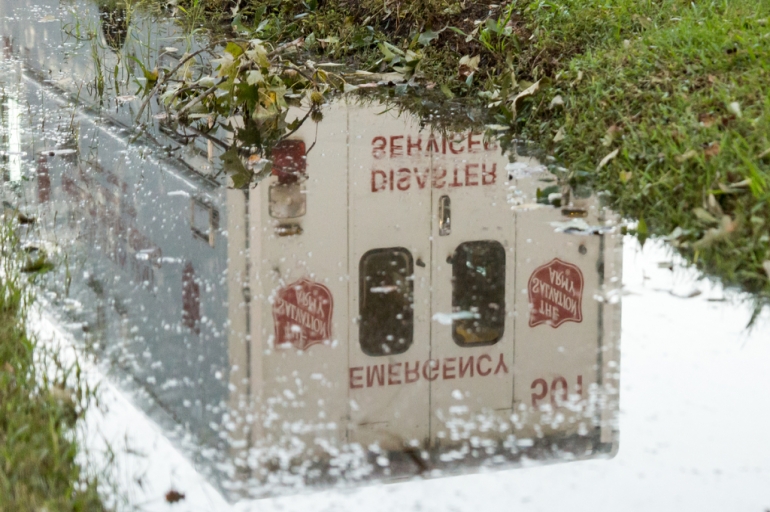Salvation Army Continues Support to the Carolinas after Hurricane Matthew
Shelley Henderson | shelley.henderson@uss.salvationarmy.org

Charlotte, N.C. (October 24, 2016)—Salvation Army Emergency Disaster teams continue to serve the Carolinas after Hurricane Matthew significantly impacted both states in early October, 2016. Some homes are still without power because of widespread flooding in eastern North Carolina and northeast South Carolina; in some communities power infrastructure must be rebuilt before power can be restored. Two weeks after the storm, more than 500 people are still living in shelters. In some locations, local emergency disaster officials are requesting service from The Salvation Army for the next two to six weeks.
Today 16 mobile feeding units are providing food, hydration, and emotional and spiritual care to communities throughout the Carolinas. In South Carolina, The Salvation Army is serving five neighbors in the Waccamaw area and the Florence Salvation Army is providing food at the National Guard Armory shelter in Mullins and in the Nichols area. Other mobile feeding units are in North Carolina serving flooded areas in Columbus County, Robeson County (Lumberton, Pembroke, Fairmont, and Allenton communities), Wayne County (Goldsboro), Edgecombe County (Princeville), and Dare County in the Outer Banks. All other storm-impacted Salvation Army locations who have resumed to normal operations are still in contact and coordination with local emergency management, ready to respond to requests as community needs are assessed.
At the peak of disaster relief service, 26 mobile feeding teams of officers, employees and volunteers from all over The Salvation Army's Southern Territory were serving the Carolinas. To date, The Salvation Army in the Carolinas has provided 126,095 meals, 216,662 snacks and drinks, 4,735 cases of spiritual and emotional care, and Salvation Army officers, employees and staff have given 24,711 hours of service.
"We are not just a bottle of cold water or a warm meal. We provide spiritual support and prayer for people whose lives are changed by disaster," said Major Richard Watts of The Salvation Army of WIlmington."We are here to serve in the name of Jesus Christ and will be here as long as we are needed."
We need your support.
Natural disasters require additional resources to meet the demand on services; monetary gifts allow us to respond to the needs of individuals and families whose lives were changed by Hurricane Matthew. 100% of your donation goes right to work to help people affected - funds are not used for administrative costs.
How People Can Help
The best way to help after a disaster is to make a financial donation to the charity of your choice. Monetary contributions also support local economies and ensure that businesses can operate when relief supplies diminish.
- Donate Online: www.salvationarmycarolinas.org/matthew
- Donate By Mail: The Salvation Army PO BOX 1959 Atlanta, GA 30301. Please designate ‘Hurricane Matthew’ on all checks
- Donate By Phone: 1-800-SAL-ARMY (1-800-725-2769)
- Donate By Text: Text STORM to 51555 to receive a donation link for easy mobile giving
About The Salvation Army
The Salvation Army annually helps more than 30 million Americans overcome poverty, addiction, and economic hardships through a range of social services. By providing food for the hungry, emergency relief for disaster survivors, rehabilitation for those suffering from drug and alcohol abuse, and clothing and shelter for people in need, The Salvation Army is doing the most good at 7,600 centers of operation around the country. In the first-ever listing of “America’s Favorite Charities” by The Chronicle of Philanthropy, The Salvation Army ranked as the country’s largest privately funded, direct-service nonprofit. For more information, visit www.SalvationArmyUSA.org. Follow us on Twitter @SalvationArmyUS and #DoingTheMostGood.